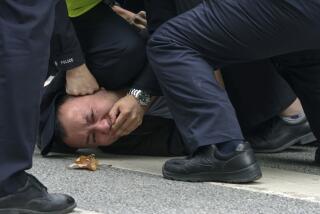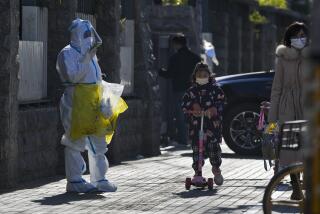Tibet Expels Foreigners, Intensifies Crackdown
- Share via
BEIJING — Virtually all foreigners were expelled from the Tibetan capital of Lhasa on Thursday as about 60,000 troops and police intensified a martial-law crackdown against pro-independence protesters.
“Soldiers are all over the place and they’re grabbing everyone,” said a frightened Tibetan woman who spoke by telephone with an Associated Press reporter in Beijing.
The woman, who works at one of the inexpensive hotels in the Tibetan quarter of the city, said soldiers began detaining large numbers of Tibetans around 3 p.m. Most foreigners still in the city were bused out at 4 p.m. and the roundup further intensified, she said.
“Many people--it is many more than when the foreigners were here,” she said. “We’re all afraid.”
She said she could not talk for long because she feared the phone was tapped.
By late Thursday evening, Chinese authorities appeared to have achieved their goal of eliminating any outside witnesses of the unfolding events. A man who answered the phone at the Yak Hotel, which until Thursday had more guests than any other in the city, said that all the foreigners were gone.
Every night from Sunday through Wednesday, foreigners at the hotel had given Beijing-based reporters detailed accounts of demonstrations, rioting and police use of firearms. The troubles began Sunday noon when a small group of Buddhist monks and nuns staged a pro-independence demonstration that escalated into violent clashes between protesters and police that left at least 16 dead.
The man at the Yak Hotel office Thursday evening spoke Chinese with an almost perfect accent, an indication that he was probably an ethnic Chinese. He said he was a hotel worker, but it was impossible to confirm that.
‘Everything Is Normal’
“The situation in Lhasa is very good,” he said, using the stilted phrasing of Chinese propaganda. “Everything is very normal.”
Asked whether rioters were being arrested, he replied: “None at all.”
The denial was contradicted even by official reports. The official People’s Daily on Thursday described the arrests of rioters. The paper’s reporter told of accompanying a police patrol in pre-dawn raids Wednesday: “They knocked on a small door and entered. A male rioter saw that the situation wasn’t good and started crying wildly, begging for mercy.”
Meanwhile, the exiled Dalai Lama, traditionally the temporal and spiritual leader of Tibet, praised the courage of Tibetan demonstrators, reiterated a call for all protests to be nonviolent and expressed fear for what may come next.
“Now no foreigners--that means no witnesses--so the Chinese now feel completely free to do whatever they want,” the Dalai Lama said in an interview with a Reuters correspondent at his exile headquarters in Dharmsala, India. “I am very much afraid that Lhasa may become like a house of slaughter. I feel very much afraid. But what to do?”
Today is the 30th anniversary of the beginning of an abortive anti-Chinese uprising that resulted in the Dalai Lama’s fleeing into exile in India. China has firmly controlled Tibet since 1951 and treats advocacy of independence as treason. The 1959 uprising was crushed with hundreds or thousands of Tibetan deaths, and it had been widely expected that there might be more trouble on this year’s anniversary.
China’s state radio announced Thursday that the official death toll since Sunday rose to 16 when four injured people died in hospitals. Foreigners who were in Lhasa and based their comments partly on eyewitness reports and partly on statements by Tibetans estimate the death toll at 20 to 50 or more.
Hu Jintao, an ethnic Chinese who heads the Communist Party in Tibet and thus is the most powerful man in the region, was quoted by state radio Thursday as telling security forces that they must crack down harder.
“You must maintain vigilance against separatists now that martial law has been declared, and you must take even sterner measures against those who stubbornly resist,” Hu said.
Doje Cering, chairman of the Tibetan regional government, signed new martial-law orders demanding the surrender of “anyone known to be involved in planning and instigating riots, taking part in violent activities, including beating, smashing, looting and burning, or harboring criminals and hiding looted goods,” the official New China News Agency reported early today.
Leniency Promised
The order promises leniency to those who give themselves up to police and stipulates that those who have knowledge of separatist activities or who witnessed attacks should report what they know to their work units or police.
“Those who make reports will be protected and those who take revenge on those who report will be severely punished,” the agency said.
The orders also instruct security forces to “strictly observe rules governing the use of weapons by the police,” the agency said.
In Beijing, the Associated Press reported, Foreign Ministry spokesman Li Zhaoxing answered U.S. criticism of its use of force in Tibet, saying China has the right to maintain order within its boundaries.
“Tibet is an inalienable part of China,” Li said. “Tibetan affairs are China’s internal affairs, which brook no interference by a foreign government, organization or individual.”
State Department spokesman Charles Redman had said Wednesday that the Bush Administration has made representations to the Chinese about Tibet. “While we recognize the right of a government to maintain order, we object to the unwarranted use of lethal force,” Redman said.
Hubert Liner, manager of the Holiday Inn Lhasa Hotel, the main hotel in the city for upscale travelers, said Chinese tourism officials told him that martial law is expected to last two to three weeks. Liner is one of the few foreigners granted permission to remain in the city, but his hotel is far from the Tibetan quarter of town and it is unlikely that he will be able to witness very much.
About 50 foreign tourists and two British journalists expelled from Tibet flew from Lhasa to Chengdu in neighboring Sichuan province on Thursday. Another 50 foreign travelers left the city by bus for Qinghai province or the Nepal border, while still more foreigners were bused to a hotel at Lhasa airport to await a flight to Chengdu today.
Guy Dinmore, a Reuters correspondent who was one of the reporters expelled from the city, reported that about 60,000 troops and police had taken up positions in and around Lhasa. Soldiers were stationed at every major intersection and at intervals of about 20 yards along major roads, he said.
Dinmore, who has been to Tibet previously, reported that “usually reliable Tibetan sources” said that up to 1,000 people had been arrested before the foreigners left.
As the tourists prepared to board buses for the airport, a Tibetan woman cried out: “We are finished. We are finished.”
More to Read
Sign up for Essential California
The most important California stories and recommendations in your inbox every morning.
You may occasionally receive promotional content from the Los Angeles Times.













